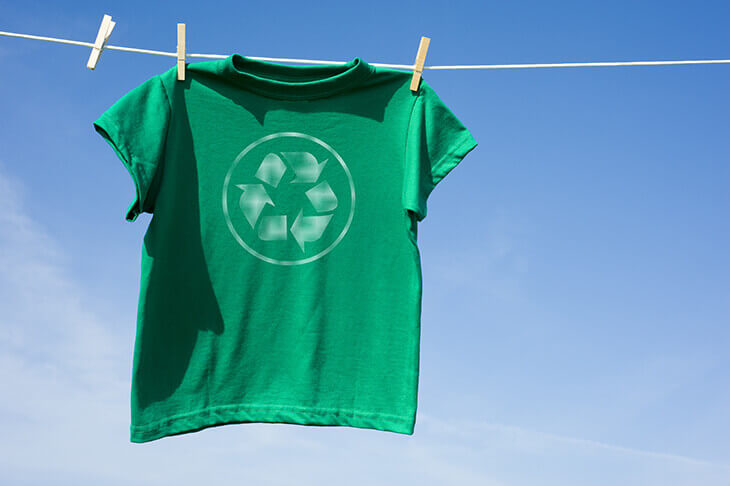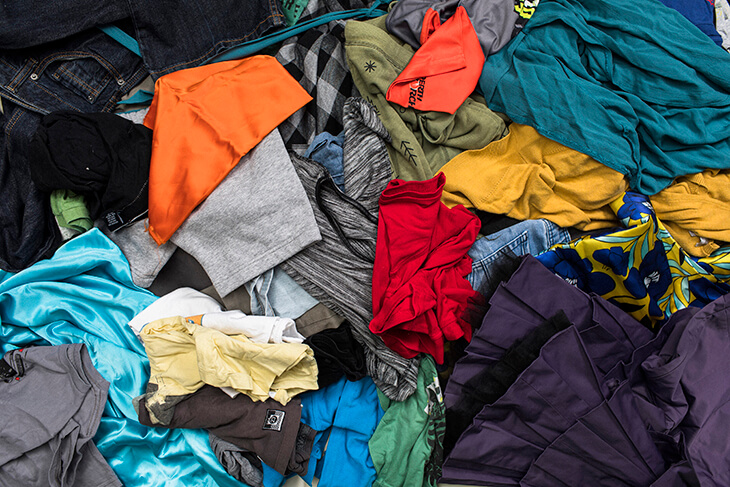
Six simple supermarket switches
Keen to start reduce your waste but unsure where to start? Try out these six switches next time you do your grocery shopping to reduce the amount of plastic waste your household produces.
Posted on: July 13, 2020
Do you need to know more when it comes to knowing how to responsibly get rid of all of worn clothes, towels and sheets?
Not everything can, or should be, donated to your local op shop. In fact, a good rule of thumb should be that if you wouldn’t gift it to a close friend or family member you shouldn’t be donating it to a charity to be resold in the first place.

Often after a big wardrobe clean out, you’ve separated out the items that are still in a good condition that can be passed on to families and friends, offered up via your local Buy Nothing page, or gifted to charity. But what about the remaining items?

Australians throw away 6,000 kilograms of clothing in landfill every 10 minutes – that adds up to a whole lot of waste very quickly.
Chances are you’ll have a bunch of items such as old underwear, worn out socks, stained shirts, towels that smell, threadbare sheets and probably some tired looking shoes.
Before you’re tempted to bin them (or worse, make them a charity’s responsibility to dispose of!) here are nine things that you might be able to do instead.
If you live in the Perth metro area there’s good news - you can take advantage of the in-store recycling schemes run by retailers H&M and Zara for your clothes and Totally Workwear for your old work boots. They accept all brands!

An increasing number of socially-aware retailers are offering take-back schemes to help improve recycling rates.
These items are then repurposed or recycled. Items in a decent condition may be donated to communities in developing countries. Items that have reached the end of their life will likely be used for rags or shredded. This material is then used as part of the construction process, often for insulation, which both avoids sending waste to landfill and replaces the need to use virgin materials in the production of these items.
One of the best things about purchasing clothing made from natural fibres (think cotton, hemp, bamboo, linen, wool and silk) is the fact they are compostable.

Looking to dispose of items made from natural products? Earthworms will happily eat them!
Cut them up first, as earthworms will happily munch away on small pieces of fabric, and you can also add them to your compost bin too in small volumes, just like you would shredded paper. We’re serious – and if you have a spare couple of hours and $50 you can even make your own worm farm today to get started!
Underwear, t-shirts and shirts made from natural fibres, as well as denim, can be easily dealt with in this manner.
Looking for a way to get rid of old towels? Why not see if a nearby dog or cat refuge, or your local veterinary practice have a need for them.

Old textiles can be donated to a local animal refuge, or repurposed to create new toys.
You could also try knotting a pair of old jeans to make a dog’s chew toy or cutting into strips to make a snuffle mat. They might not be wearable but they could offer hours’ more entertainment for your four legged mate!
There are a number of Boomerang Bag communities across WA. These are groups of people that come together to make reusable shopping bags that can be used by others when they are caught short. Most bags are made using donated fabric. To find your nearest group visit the Boomerang Bags website.

Old clothes, sheets and tea towels can be given a new life. Photo: Boomerang Bags
Done with something? Think about how you might transform it into a new item.

Don’t be afraid to research ideas for turning your clothing waste into something new.
Some ideas include:
You might also wish to salvage other parts of the clothing for future craft activities such as lace from lingerie, buttons, buckles, sequins and even shoe laces.
Here’s a trick of the trade – try adding an old piece of clothing to the bottom of a pot or hanging baskets before you add potting mix! The fabric will absorb the excess water which can then be used by the plant when it needs it, rather than have it going to waste.

Adding fabric to the bottom of a pot can help plants to retain water for longer.
A growing number of WA councils have cottoned on to the need to make textile recycling more mainstream and are organising drop-off days for residents. Collecting items in bulk enables them to work with professional firms to recycle items such as clothing and shoes rather than have to pay a landfill levy for resources that could have been reused.

If you don’t ask you won’t get. Ask your local council about whether they run textile collection days.
Remember the old adage – if you don’t ask, you won’t get!
Forgo the need for shop-bought cloths and paper towels, by simply cutting up old items and turning them into rags you’ll reuse your clothes AND save money on your next shopping trip.

Stop wasting money on wipes and paper towels. Try using an old t-shirt or pair of underwear instead.
If you’ve got more than you could possibly use why not reach out to your next door neighbours, family or even mechanic, chances are they go through plenty and will welcome a fresh supply!
Now that you understand how tricky it can be to keep textiles out of landfill, use it to your advantage – buy less, swap synthetic fibres for natural ones, and make the op shop your first port of call when you need something new.

Changing the way you shop will have a big impact. Say so-long to fast (but forever-in-landfill) fashion purchases.

Keen to start reduce your waste but unsure where to start? Try out these six switches next time you do your grocery shopping to reduce the amount of plastic waste your household produces.

Excessive packaging on food is not only unnecessary, it’s environmentally flawed. Join the nude food movement with these easy change-ups.

We’ve put together some of our favourite pieces of composting advice to help make you a compost champion. Find a new purpose for your food scraps and garden waste today!